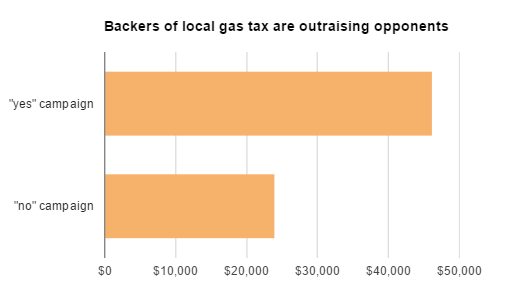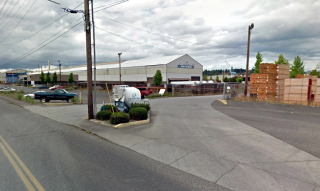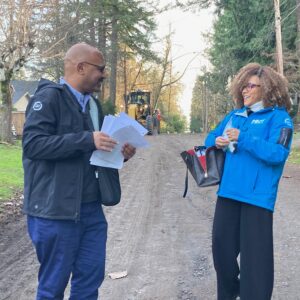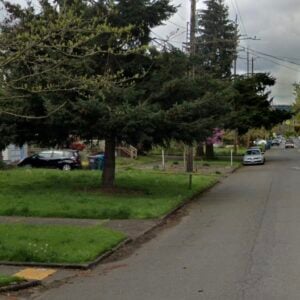If you want to understand the behind-the-scenes fundraising battle over a proposed 10-cent local gas tax in Portland, start on the 5000 block of Front Avenue in the Northwest Portland industrial area.
That’s where you’ll find two companies operating on adjacent lots: CalPortland, a pavement supplier whose local vice president gave $5,000 to the “yes” campaign, and McCall Oil and Chemical, a fuel and asphalt distributor that has given $1,800 this year to the PAC running the “no” campaign.
Donors to local campaigns are often driven by financial self-interest, but it doesn’t get much clearer than this.
Based on public records filed so far, a coalition of construction and development firms backing the four-year gas tax is easily outfundraising opponents, almost all of which are companies that sell gasoline.
Fix Our Streets Portland, the campaign backing the gas tax that would raise $64 million over four years for a combination of street repairs and safety upgrades, has reported $46,226 in contributions as of this week, compared to $24,025 in recent contributions to the PAC running the “no” campaign.
The safety upgrades would greatly increase the city’s miniscule standing budget for biking and walking improvements, including $8 million for such projects near schools, $6.4 million for sidewalk infill, $6.3 million to improve crossings and street lights, $3.2 million for protected bike lanes and $2.4 million for neighborhood greenways.
It would also put $36 million toward the $480 million or so that the city says would be needed over that four-year period to prevent any local streets from advancing toward gravel.
Election Day is May 17.

Major backers of the “yes” campaign include CalPortland Vice President Debra Kantola and Hamilton Construction, a public-works contractor that retrofitted the Broadway Bridge in 2011 to carry Portland Streetcar. Each gave $5,000.
But most of the “yes” campaign’s other $35,000 in support actually comes from major local real estate developers like Martin Kehoe ($2,500), the Zidell Companies ($2,500), Williams/Dame and Associates ($1,500), John Russell ($1,251), Melvin Mark ($1,000) and others.
NW Natural, the local gas company, put up $2,500. Its customers pay a 5 percent utility tax that was once supposed to go in part towards road maintenance but has since been reallocated for other city programs.
Other notable “yes” donors include city commissioners Dan Saltzman ($2,500) and Amanda Fritz ($500), as well as former Bicycle Transportation Alliance board chair Stephen Gomez ($250).
Advertisement
The otherwise inactive campaign of Charlie Hales for Mayor gave $1,000.
Hales and Transportation Commissioner Steve Novick are in charge of the “yes” campaign, according to its public filings, and many of the gas tax donors have been donors to one or both politicians.
For the “no” campaign, the money seems to be coming almost exclusively from people who sell gasoline.
The largest donor is Leathers Enterprises, a Gresham-based company that operates seven retail gas stations in Portland. The firm put up $10,000 on Feb. 29.
That was the most recent transaction reported by the Oregon Fuels Association PAC, the outfit run by Paul Romain and backing the “no” campaign.
Romain has so far been reporting transactions almost immediately. However, there’s a 30-day reporting deadline, so more could be coming in.

locations, contributed to the “no” campaign.
(Photo: J.Maus/BikePortland)
Other large donors to the Oregon Fuels Association PAC since Oct. 5, when Novick announced the gas tax plan, are the national fuel distributor PetroCard ($5,000), Portland-based Carson Oil ($2,375).
McCall Oil & Chemical gave $1,400 to the OFA PAC earlier in 2015 and another $400 within the period since Oct. 5.
OFA PAC was also active in the successful campaign, last November, against a proposed 5-cent local gas tax in Pendleton. We didn’t count contributions from Eastern Oregon donors received before that election for this story. For this year, it’s also registered in opposition to a proposed gas tax hike in Sandy, 20 miles southeast of Portland.
One donor to the “no” campaign on gas taxes was Plaid Pantry, the Beaverton-based convenience store chain that, a few years ago, funded much of the research that poked holes in the Columbia River Crossing freeway-rail expansion. The company contributed $300 to OFA PAC on Dec. 28 for an annual total of $650.
Three Plaid Pantry locations in Portland sell gasoline.
— Michael Andersen, (503) 333-7824 – michael@bikeportland.org
BikePortland can’t survive without subscribers. It’s just $10 per month and you can sign up in a few minutes.






Thanks for reading.
BikePortland has served this community with independent community journalism since 2005. We rely on subscriptions from readers like you to survive. Your financial support is vital in keeping this valuable resource alive and well.
Please subscribe today to strengthen and expand our work.
Surprise non drivers are proponents of the tax.
Drivers – you’d think – would be proponents of nondrivers. What was your point again?
What is a “surprise non driver”?
A surprise non-driver is the one behind the wheel of a motor vehicle and when is in the middle of texting is surprised when he hits a pedestrian in a crosswalk. He is completely surprised, but then he realizes all he has to say is “I didn’t see him. He surprised me by jumping out in front of my car.”
I’m a driver and I support the tax. Many of the people behind the organizations that support the tax are also likely drivers. Just because someone bikes/walks/transits, that does not make them exclusively do that thing.
Right. I use all modes, and want a transportation system that allows me to do so more safely than I can now. And, I’m willing to pay this tax.
How about instead of a 10 cent tax on gas…a dollar tax on bicycle tires and tubes? Fewer people ride bikes than drive, so the tax for bikes should be higher to help raise an equivalent amount of money the gas tax would. Do you think the people that don’t drive, but do bike, would be in favor of such a bike tire/tube tax?
Or how about suggesting that a bike tire/tube tax be combined with the gas tax proposal, as an incentive in favor of the tax from supporters of more and better infrastructure for biking? That would be a true verification of commitment to the gas tax on the part of people that bike rather than travel by motor vehicle.
Gas sellers are of course going to oppose taxes that directly affect their businesses’ bottom line. It’s not like their customers likely are going to drive less because of the extra 10 cents a gallon, but it does represent a hardship for some of the people driving. Because they don’t have the money to buy the big luxury vehicles, lots of people are driving ten, fifteen, twenty year old cars far less than ten thousand miles a year.
An extra dollar needing to be spent for a ten gallon tank of gas is a big deal for a lot of people. Especially considering the value of the return, which is debatable, considering the waste the revenue from the tax stands risk of being subject to. How good are the reasons given that this tax will fix the roads as suggested by proponents, do people opposing this tax have? I’ll guess that another reason some people are inclined to oppose the tax, is that it will become a money hole in addition to the potholes in the streets that already exist. Give them better reasons to believe the tax will accomplish what proponents hope it will, and maybe the opposition will relax.
That’s a 20% tax on bike parts, vs a <5% tax on gas. We as cyclists already overpay for what infrastructure we get as most is siphoned off for motor vehicle projects, so why pay more and continue to get less?
“Because they don’t have the money to buy the big luxury vehicles, lots of people are driving ten, fifteen, twenty year old cars far less than ten thousand miles a year.”
Really? Money’s the only one scale that determines vehicle choice and VMT?
While there are many reasons to dislike this stance, one of the best has to be that even if you total up all bicycle related anything worldwide, you would only be at a fraction of the dollars in the oil industry. An industry that also has subsidies, lobbyists, committees, and is TRULY an enormous, powerful industry. An industry with power and roots so deep that they can successfully argue in court that they should not have to pay as much as they were ordered to pay in a truly monumental ecological disaster.
Bikes have to fight tooth and nail over whether it was our fault we got killed or not.
I think it’s wild anyone would fund a “no”. Gas sales rarely take a huge dip and better streets and ten cents a gallon wouldn’t seem to hurt them at all. Gas stations were selling the stuff for almost 5$ less than 5 years ago after all.
$5** pardon my dyslexia.
Also eight years ago. I’m getting old.
I think you’ll find that gas station owners in Portland are opposed because they fear their customers will buy from nearby non-Portland stations.
There are plenty of drivers who claim they will drive 10 miles to other cities to avoid a 5 cent per gallon tax. Obviously, they can’t perform basic arithmetic, but they “believe” they will save money by doing so.
Several years ago I tried to persuade a friend to vote in favor of a 5 cent per gallon gas tax that was on the ballot. I asked her how often she filled her tank. “Once a month,” was her answer. Based on that I told her it would cost her an extra dollar a month or $12 per year. Her response was “No. It will cost me hundreds of dollars; I just know it.”
The city of Bend 5 cent per gallon gas tax failed in their March election (only thing on the ballot) by a margin of about 2 to 1. I fear the Portland proposal will go down by a greater margin.
You definitely can’t compare Bend and Portland like that. Bend has a much more rural character.
It is well past time to get (all) the money out of politics.
It’s always been either money or brute force (which usually requires money). Genuine question – in anything larger than a neighborhood association election, has money ever not been a loud or silent partner?
Many wealthy nations have democratic governance. The USA is actually the exception to the rule.
Unfortunately a gas tax is an extremely regressive tax. It disproportionately affects the poor who can’t afford to live in city centers and those working multiple jobs to make ends meet. It’s nice to say “just get them on bikes” but they live in the outer eastside or some other place that has been ignored by hip, visionary Portland planners for decades.
Too bad we can’t use the gas tax to improve and expand public transport.
Not true, since wealthier people drive more and spend more on gas and it is still cheaper to live closer to where you work than to drive to work.
Besides, only the wealthy can see something as expensive as the automobile as a need.
Not so simple. I’m not as hung up on the (short term) regressivity as much as others who post here are, but what you say, Tim, isn’t really the whole story either.
I’d suggest taking the longer view: Right now we have a screwed up, too-cheap-to-believe gas price system that has historically prevented us from having anything resembling a coherent multimodal transportation system. Most all other countries that have not gone for broke trying to keep gas cheap have such systems-for-everyone-not-just-those-in-cars and the way they got them is by heavily taxing gasoline. We could have such a system too, or could have had if we had started taxing gasoline for real several generations ago. The average amount of money spent on gasoline per household in those countries (both rich and poor) is considerably less compared to what the average amount of money spent by a household here in the US on (our dirt cheap) gasoline. See how this works?
There’s still an inherent assumption in both of these arguments that “the poor” actually prioritize their spending in a Maslow-esque style, which is to say that they would tend to forego cable television and/or cell phone packages – or discretionary consumer debt – in order to feed their children in a healthier manner than most inexpensive fast-food restaurants provide. I’ve never seen a discussion on the spending habits of “the poor” that fully scrutinizes the priorities of those targeted by the studies. What any American (of any wealth level) qualifies as a “need” is quite subjective.
This is something I’d still like to see proven. As Scott mentioned, it wasn’t so long ago when gas was ~$4 nationwide, and bicycle ridership was (not surprisingly) up dramatically. When you’re talking about a dime a gallon (which isn’t really how the tax manifests itself at the pump), that’s a dollar more per fillup on a 10-gal tank, which is, let’s say weekly, $4/month more on average. Quite easily offset by the fact gas prices are nearly half what they were not long ago.
Are we living in a fantasy world? After cop21 and the recent revelations in climate change science we should be trying to keep fossil fuels in the ground with every political action we take. Gas taxes are a weak but practical step towards saving the planet and it is insane to let greedy private interests use the blood money they got from ravaging the planet to steer us away from the baby steps towards the changes that need to happen soon.
Hear, hear!
Cop21 re-arranged deck chairs on the Titanic.
The single largest contributor to CO2e in the USA comes from the agri-food sector (largely meat and dairy). This contribution alone is sufficient to continue changing our climate even if we stop burning hydrocarbons for transportation.
http://www.ncbi.nlm.nih.gov/pmc/articles/PMC3797518/figure/fig3/
http://www.ncbi.nlm.nih.gov/pmc/articles/PMC3797518/
While you may be technically correct, the three categories: travel, commuting, freight, which I would group as transportation are essentially equal to the category food in that chart. And this not being eatportland but bikeportland it seems worth not losing sight of the fact that transport is still a huge contributor to climate change, and one we already know a lot about how to reduce or even eliminate the carbon from this sector.
Maybe you need to plant a garden and buy a share of pasture-raised beef. We absolutely know how to do sustainable food production, carbon-neutral freight, and off-grid solar homes. That graph is highly wtf though — light == heat == washing == communication?! What if we correctly attribute the communication carbon to commute drivers checking facebook updates? What about the high fructose corn syrup in their sodas? Are the imported plastic geegaws in China’s graph or ours?
The interesting graph to me would be before and after a carbon tax. How much of our daily lives is horribly wasteful just because it’s not cost-effective to do something besides burning more fossil fuel?
Eric, I have no more interest in eating cow than I have in eating dog. Sustainable bovine meat in the USA from *significant* commercial sources is a myth. Large quantities of CO2e are emitted to grow the forage “pasture-raised” cattle eat during the late fall, winter, and early spring. (And if that forage is “organic”, the CO2e and water load is larger due to it’s dependence on nitrogen input from non-organic animals.) Moreover, the water footprint of bovine meat is of enormous concern with a green water load of up to ~15,000 l/kg. There simply is not enough green water available to continue the meteoric rise in bovine meat consumption in developing nations. Global bovine meat consumption at even a *fraction* of the level in the USA would be truly disastrous.
http://www.fao.org/docrep/018/i3461e/i3461e.pdf
http://www.sciencedirect.com/science/article/pii/S2212371713000024
Sustainable food is solar powered and part of a closed-loop carbon cycle. Fossil carbon is not sustainable. Beef or not, nothing scales to infinity. What if we just replaced all gas lawnmowers with sheep? Sheep methane isn’t the same thing as fossil carbon… maybe urban sheep flatulence could end fracking.
KEEP PORTLAND SHEARED
With all due respect the idea that modern food production (even so-called sustainable food production) is part of a closed loop carbon cycle is nonsense. As described in my link, methane emissions from biomass, waste, and animal agriculture are a very significant contributor to the greenhouse effect and these emission are accelerating.
I agree. Absent a disaster that decimates billions, the realities of climate change will *require* that we shift our agricultural system away from methanogenic calories (meat and dairy) towards a system dependent on GHG-efficient calories (legumes and grains) grown with nitrogen fixed via renewable energy and/or crop rotation.
I’m very much looking forward to digestive methane being the only GHG problem we have yet to solve. Grass clippings cut with a gas lawn mower can also produce methane. Follow the carbon. Last week’s atmospheric carbon is not the big problem.
I look at the money the City is getting from NW natural gas with the intension that it is used on roads. I would vote for a tax if there is also a requirement that the NW money is used only for roads. There is too much bait and switch were money intended for utilities are redirected for other less tangible purposes. We need to prioritize our aging infrastructure.
Ironic that you found a Plaid Pantry with a bike rack to photograph. I think as many Plaid Pantries have bike racks as sell gas – almost none.
Apparently more than 12 (have bike racks). And did you know that 100+ have a bike pump?
http://bikeportland.org/2014/04/14/bicycle-aid-stations-coming-to-plaid-pantry-stores-104564
I’m opposed to raising the gas tax
only 10 cents.
I was at Home Depot today and saw a Silverado 3500 Duramax parked in the lot with its engine running. Nobody in the truck. I went in, did some shopping, came back out and it was still there. They don’t even publish fuel economy figures, but estimates seem to put it at around 12mpg in the city. That guy needs to start paying a serious gas tax.
Every time I see ginormous SUV’s pulling trailers full of off-road vehicles to the coast I say my mantra of gasoline being at least an order of magnitude too cheap. Then I watch my neighbors drive the quarter to full mile to our local grocery stores and repeat it again. Then I see colleagues purchase homes twenty-five miles from work when they can certainly afford housing within a mile of work and, well, you know…
Sitting in a parking lot idling? All vehicles have the same fuel efficiency in this situation- 0 mpg.
I’m assuming it’s burning more idling than your average car would. But yeah, all parking & idling is in bad form.
Always turn your engine off. Better yet, don’t turn it on in the first place.
There are cars that do that for you, like my son’s Honda Insight.
This technology is moving into non-hybrid vehicles as well. Volvo’s newest Drive-E engines have an autostop feature that turns off the engine anytime the car is stopped. It restarts when you remove your foot from the brake pedal.
Many cars have an Eco mode that does this now. I sat next to so many BMWs that stopped and restarted their engines at lights a few years ago that I went and looked it up, figuring it wasn’t just coincidence. Shortly after that I was in Atlanta on business and was given a Mercedes by my rental car company, which had an “ECO” button on the dashboard that toggled that behavior.
Incidentally, many years ago I commuted to/from Hood River to Beaverton twice a week for a little while, and there was a guy with Washington plates that I’d frequently see in an Insight tucked in tightly behind a tractor-trailer. I always wondered what his MPG was, but he was clearly doing it on purpose! (I also wonder if he ever pissed off a truck driver enough to slam on his brakes…).
Until we get everybody to start paying for MAX rides I say “no” on a gas tax.
I can’t read about Plaid Pantry without Plaid Pantry Project coming to mind… 😉
https://www.facebook.com/plaid.pantryproject
My reaction – where are the unions that represent PBOT employees? This is the best chance in decades to at least partially address the chronic underfunding of PBOT and they are MIA on funding the “Yes” campaign?